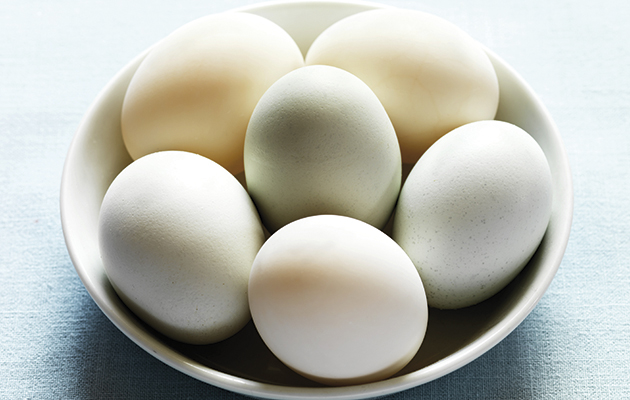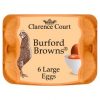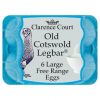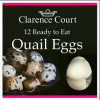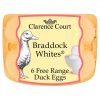The egg is a miraculous ingredient in all its forms. Hattie Ellis selects her favourite best eggs, from pale-blue Cotswold Legbars to the dark-golden Burford Browns
Hattie Ellis selects the best eggs, with the richest, most golden yolks and entirely irresistable pastel shells.
BEST EGGS
Easter helps us appreciate the egg. Loaded with springtime symbolism, it epitomises the emergence of new life. In the days when Lent fasting meant no eggs for 40 days and nights, Easter marked their welcome return to the table. Also, old-fashioned hens start laying more as the days get longer.
There’s nothing at all ordinary about an egg. It is the indispensable wizard of the kitchen, able to froth, bind, enrich and lift. Over the past decade, supermarkets have paid more attention to this miraculous ingredient and now sell the best eggs in every size and colour.
The trend for eggs began 20 years ago when a furniture-maker called Philip Lee-Woolf wanted to go into farming and noticed how the egg had become a boring object, packaged in grey cardboard. He turned to a traditional breed, popular with his grandmother, the Burford Brown. These lay eggs with a dark-brown shell and a rich, golden yolk. He also bred the Cotswold Legbar for its beautiful eggs, the shell as delicately blue as a pale April sky.
Lee-Woolf’s company, Clarence Court, was bought by a big firm, Stonegate, and these old-fashioned eggs are now sold in supermarkets all over the country. Lee-Woolf himself now sells the hens. “It’s the cheapest pet you can keep because it pays for itself in its first year,” he says.
Clarence Court has added other types of egg to its range, from the small quail to the enormous ostrich, which is the equivalent of 24 hens’ eggs, and can be enjoyed by those who want to dip in a regiment of soldiers or asparagus spears.
One of the most successful of these new speciality products is the duck egg. Its opalescent white shell and large yolk make a duck egg one of the best eggs, an object of beauty as well as of taste. It has long been favoured by farmhouse cooks for cake-making because the high protein helps a sponge to rise higher and the creamy yolks add a depth of flavour.
You now see duck egg tartlets and poached duck egg salads in restaurants. Read our recipe for duck egg with crab sandwich, North Sea brown shrimp and blade butter.
Most unusual egg?
The most unusual egg of all is found mostly in gentlemen’s clubs and smart restaurants for a short season in April and May. Black-headed gulls’ eggs are carefully and sustainably taken by licensed collectors from marshes in places such as the West Solent.
Steve Downey of Chef Direct is a leading supplier of gulls’ eggs. They are not fishy, he says; the birds eat mostly insects. “It’s very hard to describe a taste,” he says of these best eggs. “Any chef will only ever use the word ‘unique’.”
The collectors protect the birds for some time before laying, keeping a rifle on the marshes to kill any foxes or other animals that might eat the eggs. Their attention also deters poachers (thieves rather than cooks). “The colonies wouldn’t be there if it wasn’t for the collectors,” says Downey.
The cancer charity Macmillan holds an annual Gulls’ Eggs City Luncheon in May, now a fixture in the City’s social calendar. When it started, the eggs cost 4p each; now as some of the best eggs they are about £4. Such is the success that a Manchester equivalent has been set up, the Brown Shipley Gulls’ Egg Luncheon.
How to cook eggs
Whatever the type of egg you use, it always benefits from careful cooking. Even boiling an egg is not as straightforward as it sounds. Delia Smith caused a stir when she issued detailed instructions on this task in her book How to Cook. She believes that a soft-boiled egg should be put into simmering water, not boiling. But for the best texture, a hard-boiled egg is best started in cold water, heated to a simmer and then carefully timed.

Philip Lee-Woolf turned to his grandmother’s favourite hens for better eggs, the traditional Burford Brown.
Using eggs in baking
They have to be freshly-laid for poaching but when it comes to meringues and cakes, in his book Short and Sweet, baker Dan Lepard recommends cooking with eggs that are a week or more old. “Often the best ingredients have settled a little,” he says. Apparently, some chefs even leave egg whites out of the fridge, covered in cling film, in order to make better macaroons.
A medium hen’s egg is 53g-63g and a large one is 63g-73g. Either is fine but Lepard says a recipe will work if you use a bit more egg but won’t if you use less. If the cake dips in the middle, next time add an extra egg to give it more lift.
“A hen is only an egg’s way of making another egg,” wrote the Victorian author Samuel Butler. In terms of its importance at the table, an egg comes before a chicken. So, here’s to cracking eggs, be they hen, quail, duck, goose, speckled, or chocolate.
This article was originally published in 2014 and has been updated.
All products are independently selected by our editors. If you buy something, we may earn an affiliate commission. Learn more.






